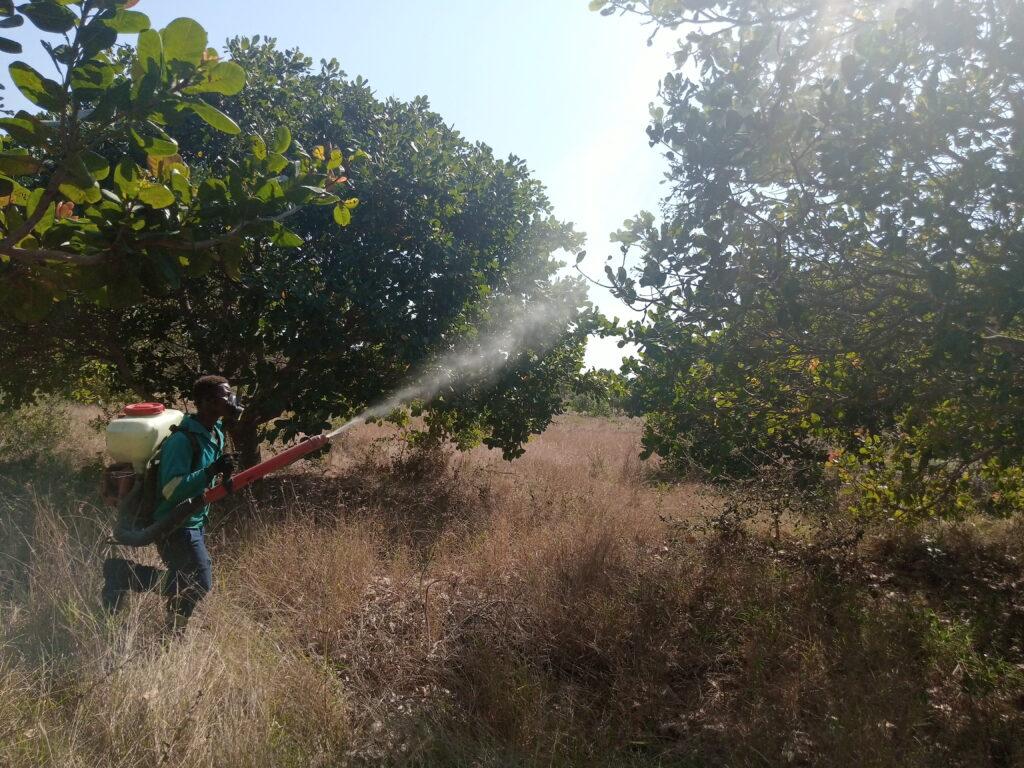Africa-Press – Mozambique. The Government of Mozambique is to delegate the chemical treatment of cashew trees to private companies, with the aim of encouraging the private sector to contribute to the production of cashew nuts in the country.
“When the government created the Institute of Nuts, it was to leverage the production of cashew nuts, encouraging the private sector to invest in this very profitable business. According to the plan, the forecast is that, by the end of this mandate, the government will stop subsidising the chemical treatment of cashew trees,” explained Ilídio Bande, director general of the Instituto Nacional de Amêndoes de Moçambique.
The Instituto Nacional de Amêndoes is responsible for drawing up a plan to ensure the transfer of cashew spraying to the private sector.
“We are currently working on models for applying this initiative in order to motivate the private sector to enter this business,” Bande said.
The Instituto de Amêndoas de Moçambique hopes the entry of the private sector into the process of spraying cashew trees will boost the cashew nut industry, as the government did not have the financial capacity to help all the producers in the country.
“We have an average of 20 million productive cashew trees and, within our financial capacity, we managed to spray only around eight million. This means that we have about 12 million trees that should be sprayed, and we think that this space can be occupied by the private sector,” Bande said.
In addition to alleviating the burden on state coffers, the government forecasts that the involvement of the private sector in the chemical treatment of cashew trees will allow Mozambique to return to the list of the largest cashew nut producers in the world, as it was in the 70s.
“If we manage to spray all the cashew trees in the country, we will be able to return to producing around 200,000 tons per agricultural season, and cashew nuts, especially those produced in Cabo Delgado, are of high quality and among the most sought after in the market,” Bande said.
Mozambique has around 150,000 cashew producers and produces 150,000 tons every agricultural season. Currently, the government spends around 400 million meticais per year on the chemical treatment of just over eight million cashew trees.
Terrorist attacks affect cashew nut production in Cabo Delgado´
Some cashew nut production acreage in the northern part of Cabo Delgado have been abandoned because of terrorist attacks forcing farmers to flee in search of safety.
“Many people have abandoned cashew nut production. I and others continue to take risks and, whenever there is relative safety, we return to take care of the cashew trees and clean the fields,” confirmed Mussa Chiondo, considered the largest producer of cashew nut in the 2018/2019 agricultural season and awarded for the same by President Filipe Nyusi.
In addition to cashew producing entities, the terrorist attacks have also affected companies that export cashew nuts, as half of their production comes from the northern area of Cabo Delgado.
“We process around 3,000 tons of cashew nuts, and most of it came from the north of Cabo Delgado, Mueda and Nangade. But now, because of the terrorist attacks, it is difficult to reach the area and we are no longer getting cashew nuts from those districts,” said Francisco Biale, representative of Korosho, one of the companies in the province that exports cashew nuts to India and countries in Europe.
In addition to terrorist attacks, cashew producers in Cabo Delgado are concerned about the wave of theft of their production and are calling on the government to take measures to address the situation.
“There are people in bad faith who are stealing our production. Some come at night, others even during the day, and take almost everything they find in the cashew trees,” said Estevão António, a cashew nut producer from Namuno, in the south of Cabo Delgado province.
To counter this, some cashew nut producers have hired guards for their orchards in areas where thieves have already been caught, but the effort is not having any effect, allegedly because the perpetrators are not punished by the judicial bodies.
“Our laws don’t help, because when we catch the thieves, the police immediately release them, claiming they have not committed a crime. So we are asking the government to punish these people, in order to stop the harm to us,” António pleaded.
Cabo Delgado, with more than 30,000 producers, produces an average of 20,000 tons of cashew nuts annually.
By
Hizidine Achá






